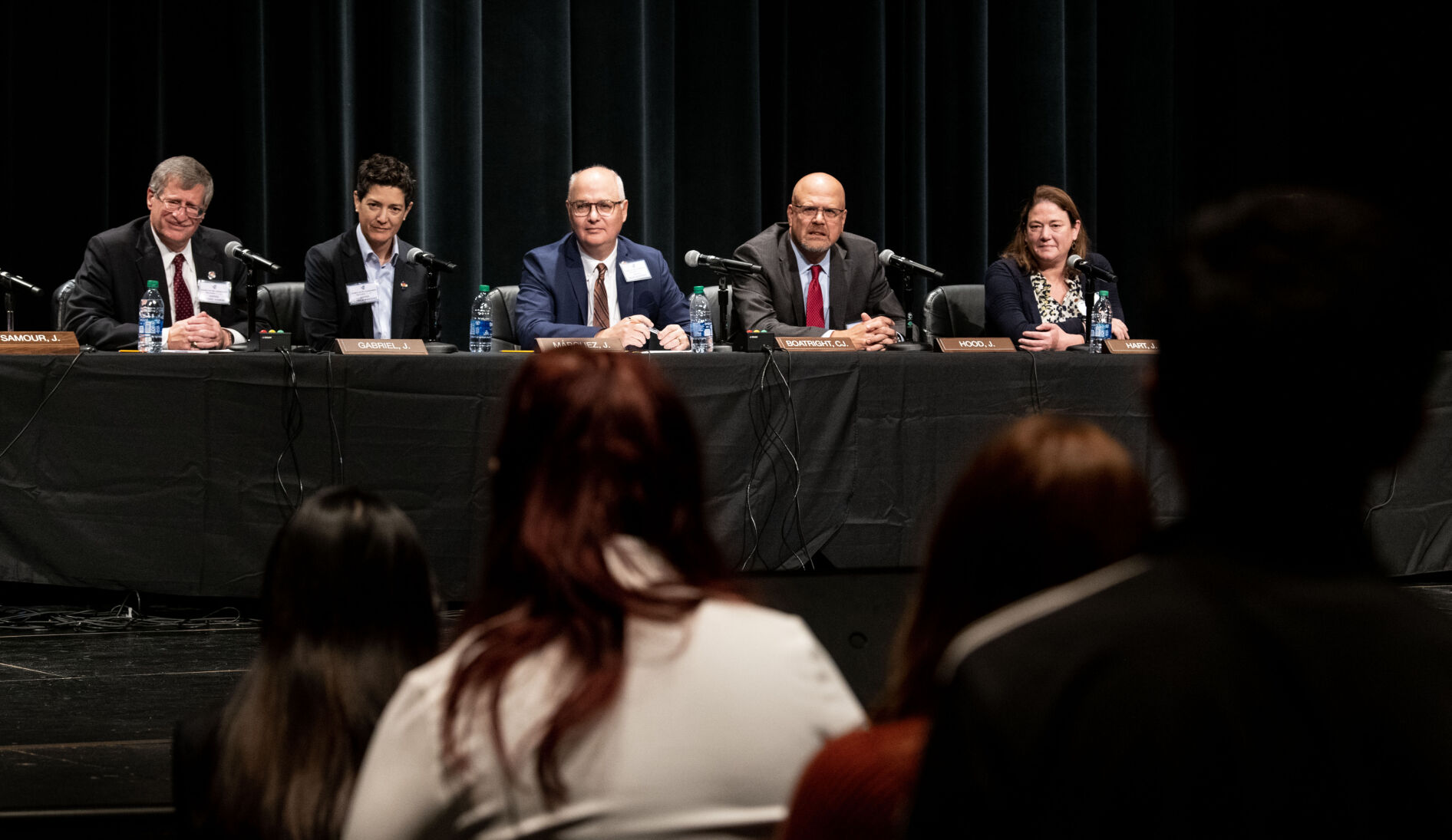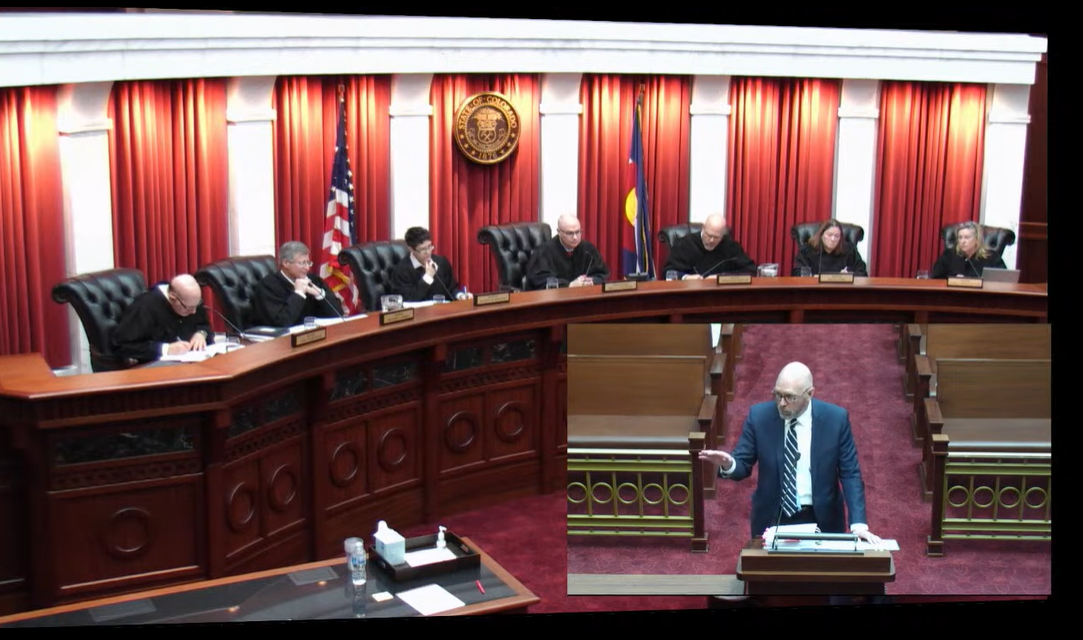Colorado Supreme Court to hear cases on open records, illegal sentencing, insurance dispute

The Colorado Supreme Court announced on Monday it will hear appeals in multiple cases, including the question of whether the public may access information about law enforcement officers who have been decertified for misconduct.
At least three of the court’s seven members must agree to review an appeal.
Among the cases granted, the justices took up a criminal appeal over a potentially illegal sentence and they will evaluate what information a trial judge could use when penalizing an insurance company. Also, the court signaled it could intervene in an ongoing class action lawsuit in which the trial judge may have improperly ordered the plaintiff to disclose confidential information.
Finally, the justices narrowly declined to take up the prosecution’s appeal in a criminal case involving a biased juror.
Dueling open records laws
The Peace Officer Standards and Training (POST) Board manages the certification and training of law enforcement officers in Colorado – including those decertified for misconduct. Beginning in 2019, reporter Christopher N. Osher of The Gazette and the Chicago-based Invisible Institute sent a series of requests to POST seeking data about the law enforcement officers certified and decertified in Colorado.
The Department of Law, which is home to POST, determined the requests were subject to the Colorado Criminal Justice Records Act, which allows for greater withholding of information than the state’s primary disclosure law. As a result, it largely denied the records requests.
Denver District Court Judge J. Eric Elliff upheld that decision. He found POST facilitates and collects criminal background checks on officers, so it falls under the legal definition of criminal justice agency because of its “collection, storage, or dissemination of arrest and criminal records information.”
A three-judge panel for the Court of Appeals appeared skeptical that any agency that handles criminal background check records is necessarily a criminal justice agency. Ultimately, however, it concluded “any” activity related to collection of criminal records under state law qualifies an entity to be a criminal justice agency. POST, as an entity that collects and stores criminal records when it revokes an officer’s certification, fit that description.
If the Court of Appeals’ decision stands, warned attorneys for Osher and the Invisible Institute to the Supreme Court, it “will jeopardize the public’s long-standing ability to access the records of numerous state agencies that necessarily obtain criminal records for professional licensing purposes – agencies that do not resemble those that would be included in any commonsense definition of ‘criminal justice agency.'”
The Supreme Court has agreed to review whether POST is subject to the state’s more restrictive law governing criminal justice records.
Clarity Media Group, the parent company of Colorado Politics, also owns The Gazette.
The case is The Gazette et al. v. Bourgerie.

Illegal sentence, take two?
In its 2019 decision of Allman v. People, the Supreme Court ruled judges may not sentence defendants to prison plus probation in the same case. Among other reasons, probation is an alternative to incarceration and state law envisions judges must choose one or the other.
Fast forwarding to 2021, Bradford Wayne Snedeker appeared in Boulder County for resentencing. At the time, he had been serving a sentence outlawed by Allman. Snedeker already completed the prison portion and was in the process of serving 20 years of probation.
Chief Judge Ingrid S. Bakke resentenced Snedeker, imposing 20 years of probation again with credit for his prison time. Snedeker’s attorney objected that because he had already served the incarceration portion, it was still a prison-plus-probation sentence that violated Allman.
A panel of the Court of Appeals upheld the sentence, reasoning the solution to Snedeker’s original sentence was not cutting off the portion that made it illegal – the probation component – but the imposition of a new, legal sentence.
“Because Snedeker’s prior sentence is void, and the new sentence is a probation sentence without any prison component, we conclude that Snedeker’s new sentence conforms to Allman‘s interpretation,” wrote Judge Jerry N. Jones.
Snedeker appealed to the Supreme Court, pointing out he was originally required to serve prison plus probation and, even after Allman, was still serving prison plus probation. That outcome violated the “spirit” of Allman, his lawyer contended.
The Supreme Court will answer whether Snedeker’s sentence remains illegal.
The case is Snedeker v. People.
Insurance dispute
After another driver rear-ended him in Denver, Marcus A. Fear received neck, back and head injuries. The responsible driver’s insurance company paid Fear $25,000 for his injuries, pursuant to the policy limits.
Fear then sought additional benefits from his own insurer, GEICO, arguing his injuries exceeded $25,000. Fear did not accept GEICO’s settlement offers because they required him to release the company of further liability. Instead, Fear sued GEICO under state law for unreasonably delaying or denying the payment of benefits.
In 2021, District Court Judge Marie Avery Moses penalized GEICO for failing to pay Fear $3,961 on his claim, which the company’s own evaluation found to represent the minimum amount Fear was owed. She noted the Supreme Court previously held that insurers should not unreasonably deny payment on the undisputed parts of a customer’s claim, even if other portions remain contested.
A panel of the Court of Appeals reversed, concluding the $3,961 figure was generated internally during GEICO’s efforts to settle Fear’s claim, and was not admissible as evidence. It ordered Moses to recalculate GEICO’s penalties.
Fear appealed to the Supreme Court, with the Colorado Trial Lawyers Association supporting his petition.
“Of course an insurer’s evaluation of the benefits owed to its insured is relevant to the reasonableness of the insurer’s conduct,” the group wrote. “And of course it is unreasonable for an insurer to record in the claim file that its insured is entitled to … damages while at the same time refusing to pay those damages.”
The Supreme Court will review whether the penalties against GEICO should stand.
The case is Fear v. GEICO Casualty Company.

Disclosure of ‘privileged, confidential and private’ information
Jina Garcia is pursuing a class action lawsuit against Centura Health, alleging the hospital operator improperly files liens – claims against a person’s property to satisfy a debt – against people who have insurance, which Centura is obligated to bill first.
Centura requested certain documents and communications from Garcia, including her credit reports, insurance documents and any claims she made related to the automobile accident that landed her in the hospital. Centura argued the information was relevant to Garcia’s alleged injuries and the payment of her medical expenses.
Last month, Denver District Court Judge Andrew J. Luxen agreed Garcia needed to provide Centura with the requested documentation. Garcia then appealed directly to the Supreme Court.
“The discovery ordered by the trial court seeks privileged, confidential and private medical, financial, attorney work product and attorney-client privileged information, which is irrelevant to the claims in this case,” her lawyers wrote.
The Supreme Court has directed Centura to explain why it is entitled to receive the disputed information.
The case is Garcia v. Centura Health Corporation.
The biased juror
Finally, the justices narrowly declined to hear a criminal appeal out of Arapahoe County. Prosecutors charged Tre Miekale Carrasco with carjacking a woman, then sexually assaulting a different woman days later. During jury selection, Carrasco’s attorney asked whether any jurors felt a crime “probably happened” because of the dual sets of accusations.
A woman identified as Juror H said she had thought to herself, “He’s been busy,” when she heard about the charges.
“It sounds like it’s hard for you to come from a place where he’s a hundred percent innocent before you’ve even seen the evidence,” the defense attorney observed. Juror H replied that the characterization was “fair.”
District Court Judge Ben L. Leutwyler, after addressing the entire jury pool about the appropriate legal standards, told them to “raise your hand if you cannot give Mr. Carrasco, for any reason, the presumption of innocence.” No one raised their hand.
Although the defense attempted to remove Juror H for bias, Leutwyler declined to do so, noting she had remained silent when he asked about the presumption of innocence.
By 2-1, the Court of Appeals ordered a new trial for Carrasco because Leutwyler allowed Juror H to serve.
“Her statements indicated plainly that she would have difficulty presuming Carrasco innocent of the charged crimes,” wrote Judge Anthony J. Navarro for himself and Judge Jaclyn Casey Brown. The majority did not believe Juror H’s decision not to raise her hand unequivocally meant she had changed her mind.
Judge David H. Yun dissented, believing Juror H’s failure to raise her hand in response to Luetwyler’s questioning indicated she thought she could be fair after all.
“At some point, we have to trust that what a juror indicated is what she meant,” he argued.
The Colorado Attorney General’s Office appealed to the Supreme Court, arguing Juror H’s decision not to raise her hand should be treated as her ultimate agreement to afford Carrasco the presumption of innocence.
Chief Justice Brian D. Boatright and Justice Carlos A. Samour Jr. indicated they would have heard the government’s appeal.
The case is People v. Carrasco.












